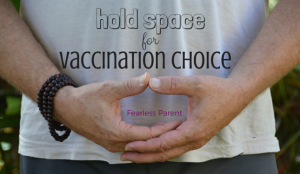Summer may feel like a funny time to be talking about fevers but during the recent heat wave, my kids had colds with fevers.
In the past I would have reached for the Tylenol hoping to bring that fever right down. When my daughter was little she would ask for “the purple medicine” when she felt awful.
I have many memories of striding into CVS with a screaming baby on one hip, looking for the grape-flavored Tylenol, while my preschooler combed the candy aisles.
We worry when our kids get sick:
- Do we need to see the doctor?
- Am I reading this thermometer right?
- Should I give her some Tylenol?
- Did I just give some last weekend? Are we using too much of this stuff?
My son was a very sick toddler. He had endless upper respiratory colds, relentless ear infections, bronchitis, and croup. I can’t tell you how many times I reached for over the counter fever and pain medication to help him feel better and let us all get some sleep. I thought that Tylenol was my friend, my trusty sidekick. I thought that a fever needed to be eliminated immediately. So I knocked that fever right out. I didn’t know what else to do. It was the best information I had to go on.
But in the back my mind I had a nagging doubt that there had to be a better way.
My son was never well.
Over the years I’ve learned a ton about how to manage illness in my family. I’ve been helped by several amazing providers who taught me so much. I learned about the immune system and getting to the root of illness rather than just stamping out symptoms, something that never occurred to me when Nick was struggling as a toddler.
A fever is valuable!
A fever is a good thing. Who knew?
Apparently, a lot of people!
A fever, it turns out, is our friend, not something to be eradicated as quickly as possible.
The Yale Medical Group advises that “[a] fever caused by infection actually helps the body destroy its microbial invader.”
The World Health Organization (WHO) informs us that the purpose behind giving fever reducing medication “is to soothe worried parents and health care workers and to give them the sense that they are controlling the child’s illness, rather than it controlling them.” WHO continues, with this encouraging wisdom, “treat the child, not the thermometer.”
According to Mercola, “it’s not your kids begging for fever-reducing drugs; it’s the germs,” because those higher temps directly kill microbes.
So, years ago as I lovingly dosed Nick with “the purple medicine,” I was actually reducing his body’s natural ability to fight the infection. As I treated the symptoms, I was perhaps lengthening the time it would take him to get better. Fabulous. But, it turns out that’s not the worst of it. I had it all backwards.
My trusty sidekick Tylenol was not my friend.
What’s so terrible about Tylenol?
Tylenol reduces glutathione.
What is glutathione?
Glutathione is the most important antioxidant in your body, your number one mechanism for detox. Mark Hyman, MD calls glutathione “the maestro of the immune system.” Once it’s depleted, glutathione is incredibly hard to rebuild. I can tell you this from experience with my son.
And there is concern that Tylenol may increase allergies in children and asthma, too. [Tylenol is also known as Paracetamol].
The dye in Tylenol is also a problem. There are three reasons the “purple medicine” is not purple in my house anymore:
1. The coloring is completely unnecessary and only added to make it more appealing to kids,
2. Many of these compounds, including Red #40, have been found by the FDA to contain cancer-causing compounds, and
3. A child’s sensitivity to these dyes may show up only as behavioral problems rather than a classic allergy.
Doctors tell parents to give Tylenol to children for EVERYTHING… fever, teething pain, sleeplessness, discomfort due to vaccination. How many of us were told to give Tylenol with antibiotics or vaccines? I was. Such a shame we are given this advice. By depleting that important glutathione, Tylenol gets in the way of the child’s ability to detox vaccine adjuvants, like aluminum.
My strategies for a fever.
1. No Meds! I let the fever cook up, particularly during the day, to let the fever do its work, fighting the infection.
2. Hydration. I give lots of water, or coconut water which is full of electrolytes. Instead of buying Pedialyte with all that food dye and a boatload of sugar to boot, here is a recipe for a homemade electrolyte drink which will keep your kids nicely hydrated.
3. Comfort. I put cool wash cloths on foreheads, give tepid baths with a cup of organic apple cider vinegar, or rub some acv on the soles of their feet while they are resting.
4. Homeopathy. When it’s time to bring the fever down for sleep or if I’m reaching my worry threshold, I reach for a homeopathic remedy. Your child’s fever symptoms will help you choose the best remedy. A quick shortcut one smart mom shared with me is “A, B, C for little kids: Aconite, Belladonna, and Chamomilla.”
- Aconite: sudden onset of fever, child is fearful.
- Belladonna: sudden onset of fever, child plays normally but with pink cheeks and/or a high fever. Child may be delirious in sleep.
- Chamomilla: child screams in pain and babies want to be carried.
5. Wet Socks Method. I know it seems counter intuitive to put cold, wet socks on a sick child but this old fashioned healing practice has a legion of modern fans. My son has sensory issues so he does not love this. If he doesn’t fight me on it, I know he is really sick.
6. Last resort. If I have to, I will give dye-free Ibuprofen, but I try to use this as little as possible. Why not reach for the Ibuprofen sooner? Ibuprofen is really hard on the protective lining of the stomach.
This is a lot of work. I know, but these are compelling reasons not to give this stuff if you can avoid it, or to give less of it if you can’t.
 Before you think I’m some kind of Martha Stewart of natural child care, rest assured that’s not the case. Following my son’s autism diagnosis, I curled up in bed at night with a big bag of frozen peanut M&M’s for months eating my weight in Red Dye #40, like it was my corporate job.
Before you think I’m some kind of Martha Stewart of natural child care, rest assured that’s not the case. Following my son’s autism diagnosis, I curled up in bed at night with a big bag of frozen peanut M&M’s for months eating my weight in Red Dye #40, like it was my corporate job.
Still worried?
Every mother’s worry threshold is different with a fever. What are the warning signs that a fever has gone on too long or is getting too high? Most moms and providers seem to agree that the number on the thermometer is less relevant than the child’s behavior. Is she limp or listless, dehydrated and not drinking or peeing? Those are the signs that worry me and push me to call the doctor. Mercola provides some nice guidelines, too.
Fever seems scarier with a very young baby, in part because we don’t yet know how this child handles illness. We don’t need to panic, although I don’t blame you if you’re anxious. A baby with a fever made me anxious! Often lots and lots of nursing will be the best thing to help your baby fight off whatever bug he has caught. It’s common sense, but with babies under the age of 6 months or for children with underlying medical issues, you’ll want to be in touch with your health care provider, if for no other reason than to ease your mind.
My son had absence seizures so anything related to seizures puts me on hyper alert. Parents are frightened by febrile seizures, but doctors respond that they are harmless in the vast majority of children. The National Institutes of Health (NIH) states in this comprehensive guide to febrile seizures:
“If a child has a fever most parents will use fever-lowering drugs such as acetaminophen or ibuprofen to make the child more comfortable, although there are no studies that prove that this will reduce the risk of a seizure.”
How do you like that? For all those years, I’d thought the primary reason to give fever-reducing medicine was to avoid the chance of a febrile seizure.
In most cases a fever is our friend. It takes a tremendous amount of energy for the body to mount a good fever, the appropriate defense for infection. For years my son’s immune system was so exhausted he would get very sick but would never have a high temperature. We have spent a long time rebuilding his immune system and just in the last year, he spiked a really high fever with a cold. As crazy as it sounds, we celebrated! I’m happy to report his body fought off the cold properly over a few days and he was right back to his sweet self!
The next time your child has a fever, hopefully not during a heat wave, consider making one change in the way you handle it. Instead of reaching for fever reducing medication make the child comfortable, keep a close eye, and allow the fever to do its infection fighting work!
Additional Resources
Natural Remedies for Fever
Homeopathy
Alison MacNeil, mom, writer, and occasional Florence Nightingale.
This post reflects the author’s views and does not constitute medical advice. Fearless Parent assumes no liability for any actions you may take or omissions you make as a result of reading this blog.













Alison,
Thank you for this well-researched and very informative piece. Most people, (sadly, many doctors included) do not seem to understand how important and necessary a fever can be. I have found that by following most of the steps that you outline above (never tried the wet socks), I can keep my kids comfortable, and their illnesses are MUCH shorter in duration. I am definitely sharing this article…;)
Allie
Great information!!! Definitely hits all the marks and then some.
Great article! There’s another easy thing that you can do for a fever – FerrumPhos cell salt – either 6x or 12x. If my children start showing a sign of fever, I start giving them cell salts every couple of hours. It usually helps them either fight off whatever they were coming down with or helps them feel OK while they are sick. I have found them to work even better than remedies in some cases.
You mention that your son “had” absence seizures. How and when did they stop?
Love cell salts, thank you Erica, great idea!
Thank you so much for this very well-stated and solid information – all things we’ve also learned the hard way, as our twins’ glutathione levels were severely reduced by the Tylenol we gave them to get them through their vaccines. We now understand how completely damaging it was to impede their ability to detox at the same time they were receiving a lot of chemicals in the forms of adjuvants, preservatives, etc. We now ride out fevers using many of your suggestions above and know that we’re letting their body’s do what they were created to do – fight infection naturally. Thank you for this post. It will no-doubt help many, many folks…
Can you share any good resources on replenishing glutathione? My daughter was accidentally poisoned with Tylenol as a toddler and her once robust immune response has never recovered.
Thank you for a great article! However, I would reconsider any use of ibuprofen or other NSAIDs. In addition to tearing up stomach lining, they have recently been linked to irregular heart rhythm and other heart conditions.
Erin, I don’t like Ibuprofen either. While writing this I had some info on Ibuprofen but I decided to take it out and save that for another time. You are right. Any links you have? I’d like to write about Ibuprofen down the road. Thanks for reading and commenting.
Hi, Tama. I’m not a doctor and this is not medical advice, but I can share some information parent to parent. I do know there are a variety of ways to supplement glutathione… some people choose to receive IVs. Others will ingest glutathione pills or liposomal glut, or rub on a glutathione cream or ointment. But glutathione is notoriously difficult to replenish. The GI tract has a difficult time absorbing it from food.
IMO, any protective strategies we choose to implement must include a good defense… avoid discretionary substances that deplete this important antioxidant. The latest thinking is that it is better to supplement the amino acid precursors to glutathione, thereby supporting the body’s ability to generate it on its own.
As with all treatments, it’s Buyer Beware. Do some research and find a way to determine whether you’re obtaining the desired result!